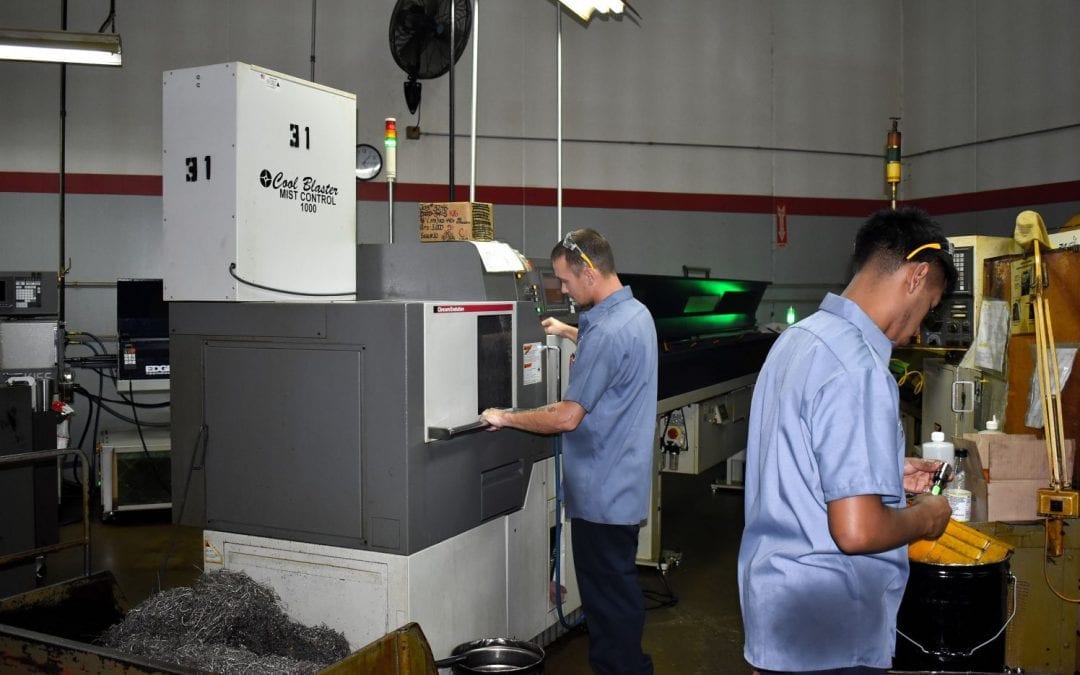Have you ever dreamed of playing a key part in the world of manufacturing, creating products that matter? Think about stepping into the shoes of a CNC machinist or operator. CNC machines stand at the heart of producing parts with unmatched precision and are used across many industries that touch our daily lives. While the titles ‘machinist’ and ‘operator’ might sound alike, they each bring their own distinct tasks, specialties, and talents to the table. To help you understand these differences, let’s take a closer look at the roles of CNC machinists and operators and discover what sets them apart.
Job Responsibilities: Operator Vs. Machinist
CNC Operator Responsibilities
- Machine Operation: Operators are responsible for setting up and operating the CNC machine. They start, stop, and control the machine during its operation.
- Loading and Unloading: They load raw materials into the machine and unload finished parts once the machining process is complete.
- Basic Maintenance: Perform regular maintenance checks on the machine, such as lubrication and cleaning.
- Monitoring: Ensure the machine is operating correctly and efficiently. They often look out for signs of wear or malfunction and report any irregularities.
- Quality Control: Inspect finished pieces to ensure they match the specifications. This might involve using measuring tools like calipers or micrometers.
- Basic Troubleshooting: While deep issues would require a technician or machinist, operators should be capable of resolving basic problems that might occur during operations.
CNC Machinist Responsibilities
- Programming: Machinists often have knowledge of programming the CNC machines using CAD (Computer-Aided Design) and CAM (Computer-Aided Manufacturing) software.
- Advanced Machine Set-Up: Apart from basic machine operation, they can perform complex setups, including selection and alignment of specific tools and fixtures.
- Tooling Selection and Maintenance: Machinist decide which tools are best for specific jobs and ensure they are sharp, calibrated, and in good working order.
- Advanced Troubleshooting: Intricate machine problems are diagnosed and fixed by CNC machinists. This could range from software issues to mechanical malfunctions.
- Blueprint Reading: Machinists interpret and understand complex blueprints and schematics to determine the specifications of the part being made.
- Quality Control: Machinists might have a deeper role in QC, ensuring that both the process and the final product meet rigorous standards.
- Continuous Improvement: A machinist often plays a role in refining and optimizing the machining processes, making adjustments to improve efficiency and quality.
While there’s overlap in the roles, a CNC operator typically focuses on running the machine and ensuring basic quality, while a CNC machinist has a deeper knowledge of the entire process, including programming, complex troubleshooting, and process optimization. In many smaller shops or specific situations, the roles might merge, and one person could be responsible for both sets of tasks.
CNC Operator and CNC Machinist Skills and Requirements:
CNC Operator Requirements
To become a CNC operator, you typically need the following qualifications and skills:
- Education: A high school diploma or equivalent is generally required. Some employers may offer on-the-job training or apprenticeship programs.
- Technical Knowledge: Basic understanding of machining processes, tools, and materials used in manufacturing.
- Computer Skills: Proficiency in basic computer operations and the ability to load and execute CNC programs.
- Attention to Detail: Precision and accuracy in following instructions, making adjustments, and performing quality checks.
- Physical Stamina: Ability to stand for extended periods, lift heavy materials, and perform repetitive tasks.
- Communication Skills: Clear communication to report any issues or irregularities to supervisors or machinists.
- Problem-Solving: Basic troubleshooting skills to address minor machine or tooling issues.
CNC Machinist Requirements
To become a CNC machinist, you need a higher level of expertise and skills compared to a CNC operator:
- Education: A high school diploma or equivalent is typically required. Some machinists pursue technical or vocational education in machining or related fields.
- Technical Knowledge: In-depth understanding of machining processes, tool selection, material properties, and CNC programming.
- Computer Skills: Proficiency in CAD/CAM software for creating and editing CNC programs.
- Mathematics: Strong mathematical skills for interpreting technical drawings, calculating dimensions, and tolerances.
- Precision and Accuracy: Keen attention to detail and the ability to work with tight tolerances and precise measurements.
- Mechanical Aptitude: Understanding of machine mechanics, tool setup, and the ability to troubleshoot and optimize machining processes.
- Quality Control: Proficiency in using various measuring instruments and gauges to ensure parts meet specifications.
- Problem-Solving: Advanced troubleshooting skills to identify and address complex machining issues.
- Analytical Thinking: Ability to interpret engineering drawings, make decisions on tool paths, and optimize machining sequences.
- Continuous Learning: Willingness to stay updated with advancements in machining technology and techniques.
- Experience: Practical experience working with CNC machines, including setup, programming, and machining of parts.
Both CNC operators and CNC machinists play essential roles in the manufacturing industry, but machinists possess a deeper understanding of machining processes, programming, and precision. The requirements for a CNC machinist are more demanding due to their involvement in multiple stages of the production process and their responsibility for maintaining high levels of quality and accuracy.
The Avanti Advantage
Avant Engineering recognizes the value of both these roles and is actively seeking dedicated CNC Operators and Machinists to join its esteemed team. Understanding the importance of nurturing talent and bridging skill gaps, Avanti proudly offers a Manufacturing Apprenticeship program. This opportunity allows individuals to earn a competitive wage while being trained in the essential skills of the trade.
By joining Avanti, not only will you work in a cutting-edge manufacturing environment, but you’ll also embark on a journey of continuous learning and professional growth. Choose Avanti and invest in your future in manufacturing.
